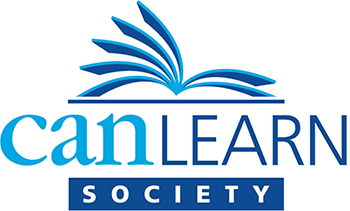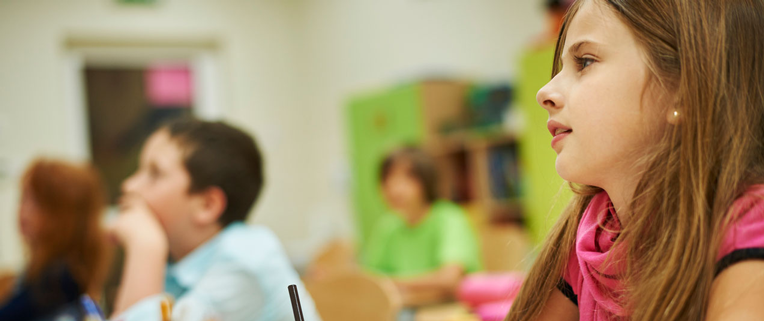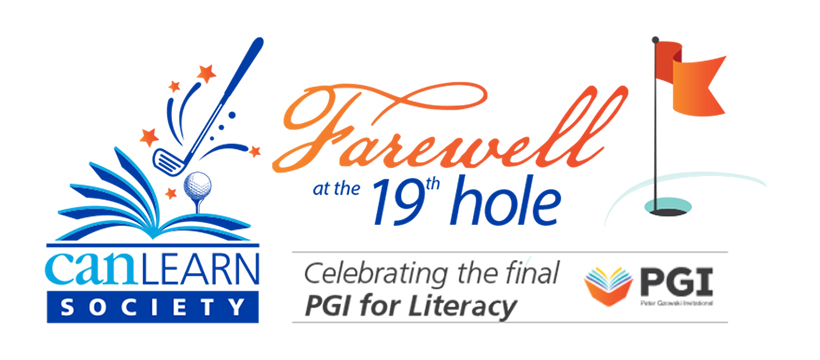Farewell at the 19th Hole: Celebrating the final PGI for Literacy
The 2022 PGI season is here, and we are thrilled to be part of it! This year’s event, Farewell at the 19th Hole: Celebrating the final PGI for Literacy, will take place on Thursday, September 8th, fittingly on International Literacy Day.
Since 1986, the Peter Gzowski Invitational has helped raise more than $15 million for literacy programs across Canada. However, after nearly four decades, 2022 will be the final PGI.
Given Peter’s and PGI’s incredible contributions to supporting literacy programs in Calgary, it is only fitting that we throw an amazing going away party – and we hope you will join us!
Hosted at Trolley 5 Restaurant & Brewery, the evening will include some of the best beer Calgary has to offer, delicious appetizers, live entertainment and a chance to practice your golf swing!
As always, the event will include an exciting raffle with the chance to win amazing prizes. Check back often for prize announcements!
As the Alberta PGI partner, we remain committed to raising awareness about literacy and helping to support literacy programs throughout Calgary. 100% of the funds raised at this event stay local and support our work to make Calgary a vibrant city of lifelong learners. Shaw Birdies for Kids presented by AltaLink will be matching all our funds raised up to 50% until August 31st, so make sure to get your tickets now!
Date: Thursday, September 8th
Time: 6:00 PM
Venue: Trolley 5 Restaurant & Brewery at 728 17th Ave SW, Calgary, AB
Tickets: $100 (includes two drinks and appetizers)
Dress Code: Golf attire or business casual
Click here to find out more and to purchase your tickets.
A big thank you to our PGI Sponsors!


CanLearn Newsletter – May 2022
Summer and Psych-ed Assessments
CanLearn Newsletter – April 2022
Reading Pilots – An Innovative Approach
Reading Pilots is an innovative approach to success for struggling readers. With COVID-19 school closures, young, struggling readers are further behind in their reading skills.
- Is reading homework a battle in your house?
- Does reading lead to tears?
- Does your child say, “I hate reading!”
- Does your child know and understand many things but can’t read at grade level?
- Do you hear negative self-talk from your child? “I’m dumb.” “Everyone else is smarter than me.” “I can’t do this!”
- Does your child try to avoid going to school?
- Are there regular tummy aches or headaches with no physical symptoms?
- Have you heard anyone say, “That kid is smart. If only he/she/they would just try harder….”
If you and your child are experiencing any of the symptoms above, Reading Pilots may be the right choice!
Why choose Reading Pilots for your child?
- Reading Pilots is designed to provide intentional, intensive direct instruction for students regardless of their reading level.
- Reading Pilots builds confidence by creating immediate small successes in a calm, relaxed environment.
- Reading Pilots is a one-on-one learning environment, so there’s no need for students to measure up to peers.
- Parents are taught low stress, fun ways to read and encourage reading at home. No more tears!
- Reading Pilots is successful!
Here’s what parents say:
We appreciate your service so much. It is life changing.
Jody was absolutely amazing, and my daughter loved going to see her. We have seen huge gains with our daughter, and most of all, she has a lot more confidence all around and loves to read. I can’t thank Jody enough!

Reading Pilots Sounds Wonderful! Is It Magic?
Yes, it is wonderful! But it’s not magic. We use the strategies and techniques at Reading Pilots based on the Science of Reading and in current best teaching practices. We follow the work of renowned reading experts like George Georgiou, Louisa Moats, David Kilpatrick, Mark Seidenberg and others who have years of published research and years of teaching experience. We pick and choose the strategies that fit best for the learning needs of each of our students, and we make sure they are comfortable using them. So, no, it’s not magic. It’s even better – it’s real!
Is There A Cost For Reading Pilots?
CanLearn is a not-for-profit organization, so Reading Pilots runs on a cost-recovery basis. The fee for ten weeks of lessons is $1500. There are some funds available for families that cannot afford the cost.
How Can We Register Our Child For Reading Pilots?
Email the Reading Pilots coordinator, Jody Wood, at [email protected]
New! An Online Group for Adults with ADHD
We are offering a brand new 7-week group called ‘Let’s Talk ADHD’ for adults with ADHD to learn skills and tools to:
- help increase motivation
- improve focus
- manage distractions
- regulate emotions
- handle stress
- improve interpersonal skills
The Fall 2022 group will run on Wednesdays from September 28 to November 9 from 5:30 to 7:00 PM
For more information, and to register for this amazing new group, go to the Adult ADHD Group page.
Social Skills Programs: Why Are They Important?
CanLearn Friends Program
What are social skills? We use social skills every day to work together and talk with others.
Research tells us that social skills can help children develop into healthy adults. Children who have better social skills have more self-confidence. They have better relationships with friends and do better at school.
When a child struggles with social skills, it can affect their future. It can lead to social, emotional, or behaviour problems. It can lead to mental health troubles, crime, drug abuse, and work problems.
Many children with ADHD, and autism, live with social and emotional skills problems that can put them at risk.
The good news is that children can learn social skills. They can develop these skills by taking part in a social skills program. Social skills programs help children learn the basic skills needed to build social skills and practice those skills in a safe environment. Children learn positive social behaviours by demonstration, role-playing, solving problems, discussions, and take-home activities.
The CanLearn Friends Program offers high-quality social-emotional training to at-risk children and youth in Calgary. Because we lost opportunities to be social during COVID-19, children must continue to work on these important skills.
Click here to find out more about the CanLearn Friends program.
Happy Family Literacy Day 2022!
Family Literacy Day takes place on January 27th. Its purpose is to raise awareness about the importance of reading and engaging in other literacy-related activities as a family. Since 1999, thousands of schools, libraries, literacy organizations and other community groups have taken part in this initiative.
With Family Literacy Day 2022 right around the corner, we would like to thank all families who have participated in CanLearn family literacy programs for reading, learning, and growing with us!
As the Covid-19 pandemic continues to continue to impact families and schools, family literacy is more important than ever. What can you do to build reading skills in the context of your family?
We invite you to consider the following strategies:
- Keep in mind that it is not just children that benefit from reading! Reading is very, very good for your own health (https://www.healthline.com/health/benefits-of-reading-books), so make sure you read something for yourself every day!
- Make reading a priority in your home! Drop everything, turn your phones and other devices off, and spend some time reading after dinner, or find another system that works for your family. Allow your children to see you reading and talk about what you were reading with enthusiasm. It is important to show your children that you value reading and are a reader yourself.
- Read to and with your children! Read regularly and often. Read as fluently as you can. Use different voices for characters, sound effects, and variations in voice volume and tone. Stop frequently to ask questions, predict, infer, and make sure your child understands the story. Make connections with other books and everyday experiences. As they move towards being independent readers, listen to them reading. Don’t feel you need to correct every error or teach every sound that your child struggles with. Remember that your role as a parent is to make it fun and enjoyable for you and your child by encouraging them and building up their confidence.
- Get your family talking! Some researchers think that up to 15% of young school children don’t have the oral language skills to cope fully with the demands of schools (Hart and Fielding-Barnsely, 2009). Many of these kids struggle with reading, some for their whole lives. The good news is that many activities you and your children already enjoy doing together can encourage and build language skills. For example, “What was your favourite thing about today?” is a great dinner table conversation starter you can use.
We are only a few weeks into the year 2022. Although we are still unsure of when exactly the Covid-19 pandemic will end and what the overall impact will be, we can already see the negative impact it is having on our society’s mental wellbeing. Reading can help us all increase our resilience during these unprecedented times and strengthen our social-emotional skills. Often called “soft skills,” these are the skills that help us get along with other people, regulate our emotions and interact positively with the world. Now, more than ever, we must talk, think, and read about social-emotional issues and become equipped to cope with life challenges.
We would like to share a few of our favourite books that can help us tackle social-emotional issues and build skills to cope with life challenges.
Books to share with preschool children:

This is a wonderful book to teach kids about emotions. It covers a range of feelings and will help your children start to identify situations or times they may feel angry, sad, disappointed, and joyful!

One day, Color Monster wakes up feeling very confused. His emotions are all over the place; he feels angry, happy, calm, sad, and scared all at once! To help him, a little girl shows him what each feeling means through colour.

This is a good book to help children understand that its ok to “have moods” or “be grumpy sometimes.
Books to share with school-age children:

This is an engaging and interactive book that guides children through the practice of naming their feelings and the physical sensations that accompany them. Learning to tune into their bodies and do this, is a foundation for self-regulation. Listening to My Body is a wonderful social-emotional tool for families!

If you drop just one soda can out the window, it’s no big deal … right? But what if everybody did that? What if everybody broke the rules … this and other questions are answered in a child-friendly way and show the consequences of thoughtless behaviour.

This story tells the tale of a boy who is very wiggly, and people keep telling him that he has ants in his pants. He keeps trying to find those ants until his mom finally clues him in that they are talking about his wiggly he is.
And a Few Books for YOU (the parent):



When you read together as a family, you will experience moments of joy similar to these:
… or you may decide to do some singing and dancing:
… or some reflecting:
We wish you a lot of reading, talking, laughing, and dancing together on January 27th and every day!
‘Tis the Season
By Nada Jerkovic
It’s a magical time of year. A time of year when we all think about showing the important people in our lives how grateful we are for them. However, around the middle of December, it’s easy to start feeling bogged down. Stress, lack of time, Christmas shopping, decisions, and freezing weather can all stand in the way of finding the vaunted holiday spirit.
When I start feeling like the Grinch, I usually make time to watch some of my favourite video clips or movies – some of which may be familiar to you.
I also go back to some of my favourite holiday short stories:
- David Sedaris’ “ Santa Land” Diaries is about the time that the author, in his 30s and out of work, had to suffer the indignities of taking a job as an elf at the Macy’s Santaland in New York City. It never fails to make me laugh.
- Truman Capote’s story “A Christmas Memory” in which the narrator, Buddy, looks back on a particularly beautiful Christmas she spent with his much older cousin is another one of my favourites. Buddy and his cousin have a Christmas ritual in which they bake and then give away fruitcakes to people they barely know. Click here to read the story.
Comparing the original version of the song “Do They Know It’s Christmas Time” to more recent ones makes me think about how much the world has changed over the thirty-seven odd years since the song was first released in 1984. But despite all this change, the constants of kindness, empathy and helping others are still ultimately what makes our lives meaningful.
When lengthy pre-holiday task lists are calling your name, it is easy to forget that the holidays are a time to spend time with friends and family, to reflect, and slow down before another busy year begins. Nichole Nordman’s beautiful song helps me keep this in mind.
By now my inner Grinch experiences a complete change of heart and, just like the Grinch in the story, I am ready to admit, “ I’ve changed my mind! Christmas is a wonderful holiday after all!”
I believe that everyone deserves a book for Christmas! Here are a few books I think important people in my life will enjoy.
- All my friends and family members who are parents would enjoy The Christmas Wish by Lori Evert, a wonderful holiday book with gorgeous photos and a sweet story of giving and helping.
- My friend and her 7-year-old son who announces that “today is the worst day ever” several times a day would laugh their heads off at The Worst Book in the Whole Entire World! by Joey Acker.
- The Most Magnificent Thing by Ashley Spires – is the story about a girl and her very best friend, who happens to be a dog. The girl has a wonderful idea. “She is going to make the most MAGNIFICENT thing! But making her magnificent thing is anything but easy, and the girl tries and fails, repeatedly. Eventually, the girl gets really, really mad. She is so mad, in fact, that she quits. But after her dog convinces her to take a walk, she comes back to her project with renewed enthusiasm and manages to get it just right. This funny book offers a perfect example of the rewards of perseverance and creativity. Good for friends with kids!
- The B on Your Thumb: 60 Poems to Boost Reading and Spelling by Colette Hiller – is a collection of rhymes to help children learn reading and spelling tricks. One of the reviews of the book says that it may even be of use to adults. A friend of mine has a daughter who is finding the process of learning to read in grade 1 challenging. She is noticing that her daughter is ready to do about anything to avoid reading at home. This would be a fun book for the two of them.
- 101 Things to Do Instead of Playing on Your Phone by Ilka Heinemann – this is an adult book and a perfect ‘hint’ book for people (myself included) who spend too much time on their phone or in front of the screen. I may decide to give this book to myself as a Christmas gift and New Year’s resolution.
- What Strange Paradise by Omar El Akkad – is a profoundly moving adult novel that looks at the global refugee crisis through the eyes of a child. Most of my friends would enjoy it. Should one of my New Year’s resolutions be to start a book club?
- Feline Philosophy: Cats and the Meaning of Life by John Grey – on the surface, this book is a playful exploration of what cats might have to teach humans about change, resiliency, and nimbleness, but there is much more to it. (I would love to discuss this book with other people, I should really start a book club or join one…)
One of my favourite authors, Neil Gaiman, says, “Books make great gifts because they have whole worlds inside of them. And it’s much cheaper to buy somebody a book than it is to buy them the whole world!”
Wishing you all of the Hope, Happiness, Wonder, Joy, and Reading that the Season can bring!



